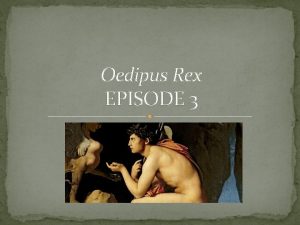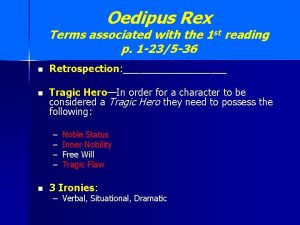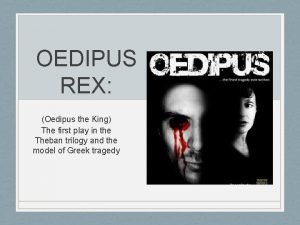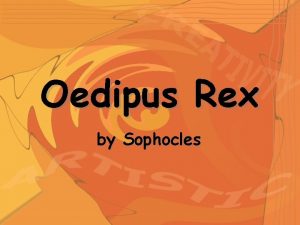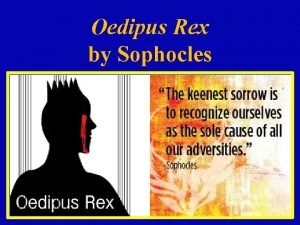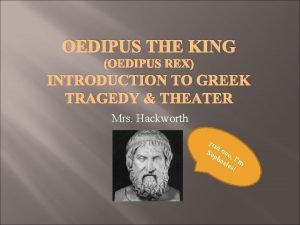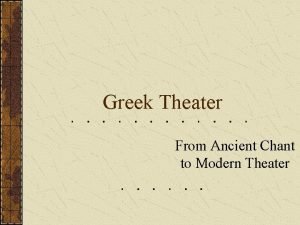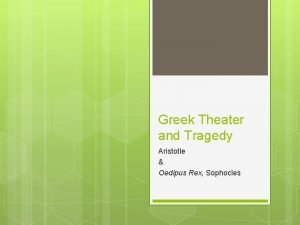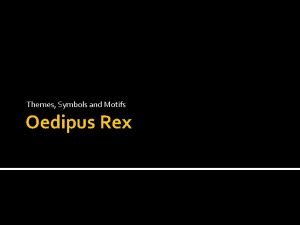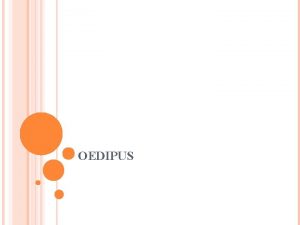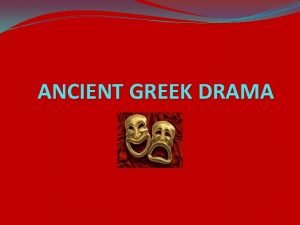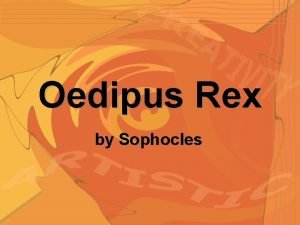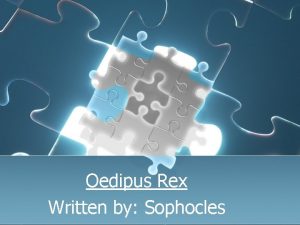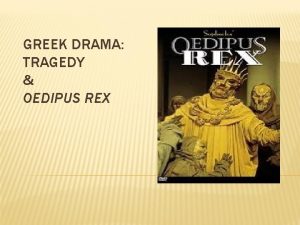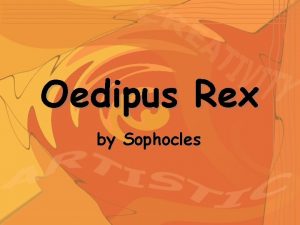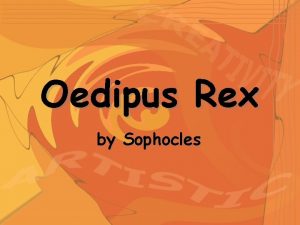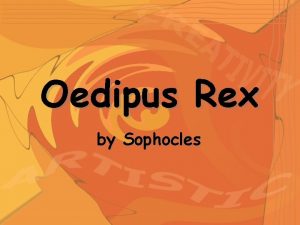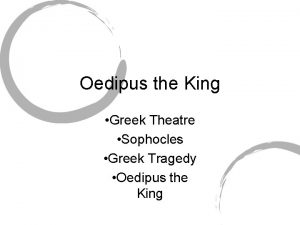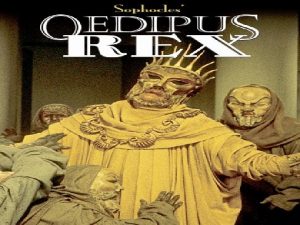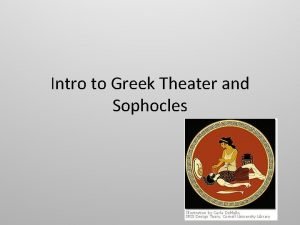Greek Theater and Tragedy Aristotle Oedipus Rex Sophocles















- Slides: 15

Greek Theater and Tragedy Aristotle & Oedipus Rex, Sophocles

Greek Theater How It did Greek drama begin? grew from religious celebrations in honor of the god Dionysus. Writers introduced plots involving characters of dramatic importance Most Greek Tragedies are concerned with the conflicts between men and the gods. What are some of the conventions of Greek Drama? Actors wore large, carved masks, no female performers

Ruins at Epidarus n n n Parados n skene proskenion n Orchestra / n altar to Dionysus Theatron n Parados

Ruins at Epidarus: Diagram (text, pg. 939)

What was the purpose of these plays? Tragedy was performed in Athens at the 3 annual festivals of Dionysus. Greek Drama grew from religious celebrations and never lost its religious significance. Attendance at these performances was a civic and religious obligation as well as a source of entertainment. The religious function of drama was to enable its viewers to experience a CATHARSIS: feelings of pity and terror (or fear); purgation of emotions.

What are the terms commonly associated with Greek Tragedy? Hamartia = “tragic flaw” (moral or intellectual)which is instrumental in bringing about the character’s downfall. Hubris = insolence of man who has been especially fortunate; sinful pride; the tragic flaw. Nemesis = just punishment for wrongdoing. Catharsis = feelings of pity and fear; audience reaction to the tragedy. Tragic Irony = statement or situation that means to the something to the character in contrast to what is discovered to be true. Deus Ex Machina = (literally, the god in the machine) technical device in Gr. Theater consists of a god suspended from a metal crane; used for unraveling in a miraculous way the unsolved problems of the tragedy. Can you think of TV shows or movies that use this device today?

What are Aristotle’s requirements for Tragedy? Tragedy must have serious action It is dramatic It should be long enough to show a character passing gradually from happiness to misery. It should represent one complete action with the incidents so closely integrated that nothing can be deleted without destroying the unity of the whole. The protagonist should be virtuous, come from a high estate and fall due to an error/flaw in his character (moral weakness which is marked by reversals (peripety) and discoveries (change from ignorance to knowledge)

Plots of Tragedy Plots The are either simple or complex. action, as 1 continuous whole is simple when the change in the hero’s fortunes takes place without peripety or discovery. The action is complex when it involves one or the other or both. PERIPETY: the change from 1 state of things within the play to its opposite. DISCOVERY: a change from ignorance to knowledge and thus to either love or hate, in the personages marked for either good or evil fortune.

Tragic Hero/Heroic Qualities The protagonist should merit our interest The tragic hero should not be perfect, yet he must be capable of understanding his circumstances. In the face of an inescapable fate, the tragic hero must react with dignity. The tragic hero must defend a noble cause The world of the tragic play is turbulent. A belief in his own freedom A supreme pride Capacity for suffering A sense of commitment Vigorous protest Transfiguration Impact

The Tragic Hero According to Aristotle: An essentially good person who, through some weakness of character or error in judgment brings doom upon himself

Requirements for a Tragic Hero Tragic events happen to a person of great magnitude (come from a high estate). Must discover the truth of his wrong choice and accept responsibility for his own actions His error or flaw is marked by reversals and discoveries

Tragic Hero Continued Choice that brought about failure must have been made to bring about results opposite to what really happens Must be a more admirable man in defeat than he was before; must gain stature through the way he meets catastrophe Moves the audience to pity

Oedipus Meets Aristotle’s definition of the perfect Greek tragedy. The chorus set the atmosphere of the play with their songs which comment upon the action of the play The divisions of the play: prologue, parodos, first scene, first stasimon, second scene, second stasimon, third scene, third stasimon, fourth scene, fourth stasimon. Fifth scene, kommos.

Sophocles: Oedipus Rex is a discussion of the conflict between faith and doubt. Oedipus represents any of us who wrestle with our own problems of faith and doubt; he represents all our hopes and our fears. Sophocles wanted Oedipus to teach that man’s confidence in his own ability is an illusion if he abandons the idea of a higher power. This play seeks truth about the cosmos. Every detail of Oedipus Rex is contrived so as to reinforce the conception of order disturbed and order restored. Knowledge comes through suffering. It was not going to happen because it was foretold. It was foretold because it was going to happen. Character is Fate. The chorus set the atmosphere of the play with their songs which comment upon the action of the play The divisions of the play: prologue, parodos, first scene, first stasimon, second scene, second stasimon, third scene, third stasimon, fourth scene, fourth stasimon. Fifth scene, kommos.

Characters of the Exposition Thebes Lais & Jocasta Corinth Polybus & Merope The Cast in Oedipus Rex Oedipus Teiresias Jocasta Priest Creon Chorus Herdsman of Zeus Messenger 2 nd Messenger Mute Persons
 Oedipus the king play summary
Oedipus the king play summary Oedipus rex exposition
Oedipus rex exposition Sophocles oedipus rex summary
Sophocles oedipus rex summary Oedipus rex summary
Oedipus rex summary Summary of oedipus rex
Summary of oedipus rex Unity of action in oedipus the king
Unity of action in oedipus the king Antigone overview
Antigone overview Greek theater vs modern theater
Greek theater vs modern theater Periaktoi
Periaktoi Oedipus rex
Oedipus rex History of greek drama
History of greek drama Shakespearean tragedy definition
Shakespearean tragedy definition Characteristics of a tragedy play
Characteristics of a tragedy play Oedipus rex themes
Oedipus rex themes What is the theme of oedipus the king
What is the theme of oedipus the king The cult of dionysus theater
The cult of dionysus theater
